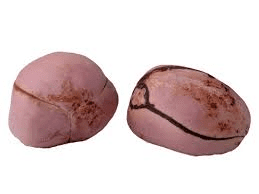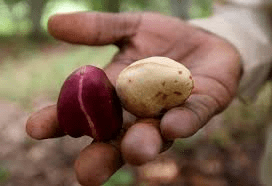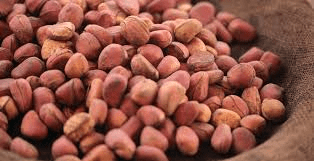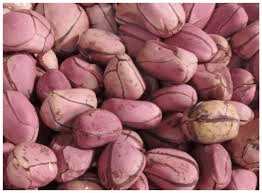Cola, or kola seeds, come from the kola nut tree, which is native to tropical West Africa and belongs to the genus Cola within the Sterculiaceae family. These seeds are renowned for their stimulant properties and have been used traditionally in various cultures for centuries.
The kola nut tree produces large, leathery leaves and small, inconspicuous flowers that eventually develop into pods containing the seeds. Each pod, which is about 5 to 10 centimeters long, holds several seeds. The seeds are typically oval or round, with a hard, woody shell that protects the inner seed.
Kola seeds are well known for their high caffeine content, which makes them a natural stimulant. They are often chewed or used to make a beverage known as kola nut tea. The caffeine in kola seeds is similar to that found in coffee and tea, providing a stimulating effect that can enhance alertness and reduce fatigue.
In addition to caffeine, kola seeds contain other compounds such as theobromine and tannins. Theobromine, also found in chocolate, has a mild stimulating effect and can contribute to relaxation and improved mood. Tannins have astringent properties and can affect the digestive system.
Traditionally, kola seeds have been used in various cultural and social practices. In some West African cultures, they are considered a symbol of hospitality and are offered to guests during ceremonies or social gatherings. They are also used in traditional medicine to treat a variety of ailments, including digestive issues, respiratory problems, and fatigue.
In modern times, kola seeds are often processed into extracts and used in beverages, particularly in cola-flavored drinks. The caffeine content of kola seeds contributes to the stimulating properties of these beverages. However, with the rise of synthetic caffeine and other flavoring agents, the use of kola seeds in commercial products has decreased.
The cultivation of kola trees requires a humid, tropical climate with rich, well-drained soil. The trees are typically grown at elevations between 0 and 1,200 meters and can reach heights of up to 20 meters. They have a slow growth rate and can take several years to produce seeds, making them a long-term investment for farmers.
Kola seeds are valued for their stimulant properties and cultural significance. Their high caffeine content makes them an important ingredient in traditional beverages and modern cola drinks, while their use in cultural practices highlights their historical and social importance.
The Economic Importance and Uses of Cola/Kola Seeds

1. Caffeine Source: Cola seeds are a natural source of caffeine, used in beverages and energy products for their stimulant effects.
2. Soft Drinks: Cola seeds are used in the production of cola-flavored soft drinks, providing a distinct taste and stimulating properties.
3. Traditional Medicine: In some cultures, cola seeds are used in traditional medicine for their stimulating and digestive benefits.
4. Culinary Uses: Cola seeds can be used as a flavoring ingredient in cooking and baking, particularly in African cuisines.
5. Chewing Stimulant: In various cultures, cola seeds are chewed for their stimulating effects and to reduce hunger.
6. Flavor Enhancer: The extracts from cola seeds are used as flavor enhancers in food products and confectionery.
7. Dietary Supplements: Cola seeds are sometimes used in dietary supplements for their caffeine content and potential health benefits.
8. Weight Management: Caffeine from cola seeds is used in some weight management products due to its appetite-suppressing properties.
9. Cultural Significance: Cola seeds hold cultural and ceremonial importance in various African traditions and rituals.
10. Economic Value: The cultivation and trade of cola seeds contribute to the economy in regions where they are grown.
11. Beverage Industry: Cola seeds are integral to the formulation of various beverages, contributing to the global soft drink market.
12. Aromatherapy: Extracts from cola seeds are used in aromatherapy for their stimulating and invigorating effects.
13. Herbal Remedies: Cola seeds are included in some herbal remedies for their perceived health benefits.
14. Cosmetic Products: Cola seed extracts are used in cosmetic products for their potential stimulating and astringent properties.
15. Animal Feed: Cola seed residues, after oil extraction, are sometimes used as feed for livestock.
16. Biofuel: Cola seed oil can be explored for use in biofuel production, offering a renewable energy source.
17. Nutritional Products: The seeds can be processed into nutritional products due to their caffeine and other nutrient content.
18. Research and Development: Cola seeds are studied for their potential applications in various fields, including food science and pharmaceuticals.
Read Also: Health Benefits and Side Effects of Opium Poppy (Papaver Somniferum)
The Products and By-products That Can Be Derived From Cola/Kola Seeds

1. Cola Beverages: Cola seeds are used to flavor cola drinks.
2. Caffeine Extracts: Extracts of caffeine from cola seeds are used in energy products and dietary supplements.
3. Culinary Ingredients: Seeds are used as flavorings in cooking and baking.
4. Herbal Remedies: Used in traditional and herbal medicine.
5. Dietary Supplements: Supplements made from cola seed extracts.
6. Cosmetic Products: Extracts used in skincare and beauty products.
7. Animal Feed: Residues used as feed for livestock.
8. Biofuel: Cola seed oil explored for renewable energy production.
9. Flavor Enhancers: Extracts used in food and confectionery.
10. Aromatherapy Products: Used for their stimulating effects.
11. Weight Management Products: Included in some products aimed at weight control.
12. Nutritional Products: Processed into products for nutritional benefits.
13. Research Samples: Used in scientific research and development.
14. Cultural Artifacts: Seeds used in cultural and ceremonial contexts.
15. Traditional Medicine Preparations: Used in various traditional health remedies.
Read Also: Powdery Mildew: Description, Damages Caused, Control and Preventive Measures
Frequently Asked Questions (FAQ’s) About Cola/Kola Seeds

1. What are cola/kola seeds?
Cola/kola seeds are the seeds of the kola tree, known for their caffeine content and use in beverages.
2. How are cola/kola seeds used in beverages?
They are used to flavor cola drinks and provide a stimulating effect due to their caffeine content.
3. Can cola/kola seeds be used in traditional medicine?
Yes, in some cultures, cola seeds are used in traditional medicine for their stimulating and digestive benefits.
4. Are cola/kola seeds used in culinary applications?
Yes, they are used as flavoring ingredients in cooking and baking, particularly in African cuisines.
5. What is the significance of cola/kola seeds in cultural practices?
Cola seeds hold cultural and ceremonial importance in various African traditions and rituals.
6. Can cola/kola seeds be used in dietary supplements?
Yes, they are sometimes used in dietary supplements for their caffeine content and potential health benefits.
7. How are cola/kola seeds used in cosmetic products?
Extracts from cola seeds are used in cosmetics for their potential stimulating and astringent properties.
8. What by-products can be derived from cola/kola seeds?
By-products include caffeine extracts, animal feed, and biofuel from the seed oil.
9. Are cola/kola seeds used in aromatherapy?
Yes, extracts from cola seeds are used in aromatherapy for their stimulating effects.
10. How do cola/kola seeds contribute to the economy?
The cultivation and trade of cola seeds contribute to the economy in regions where they are grown, supporting local livelihoods and industries.
Read Also: How to Graft an Avocado Tree to Produce Avocado Fruit

